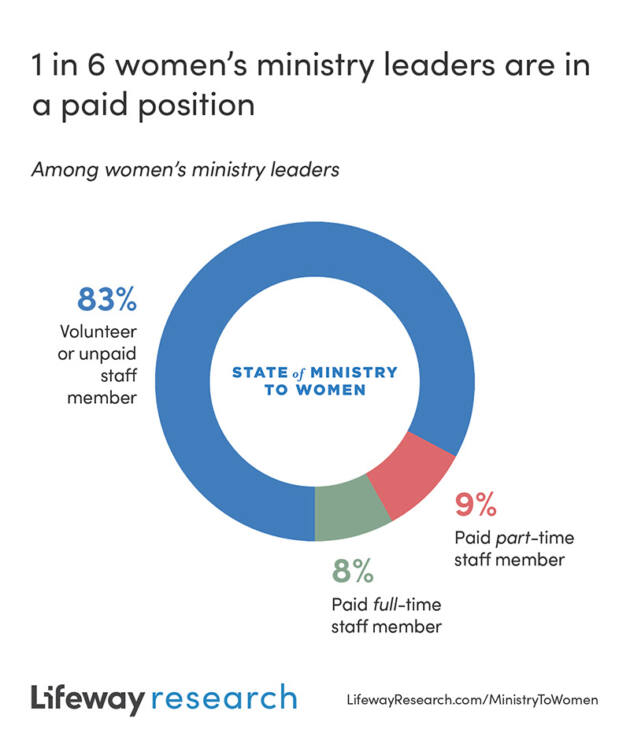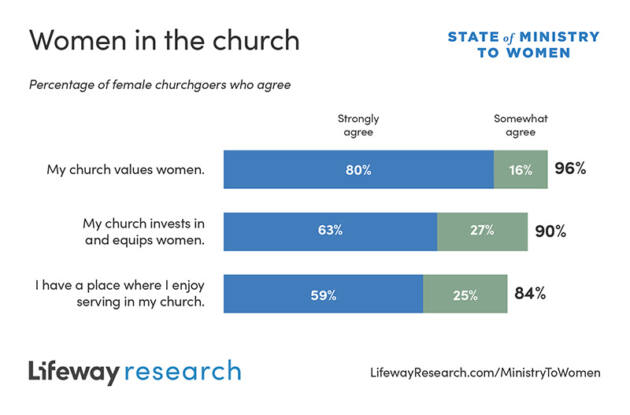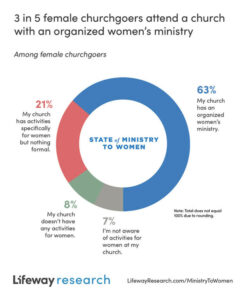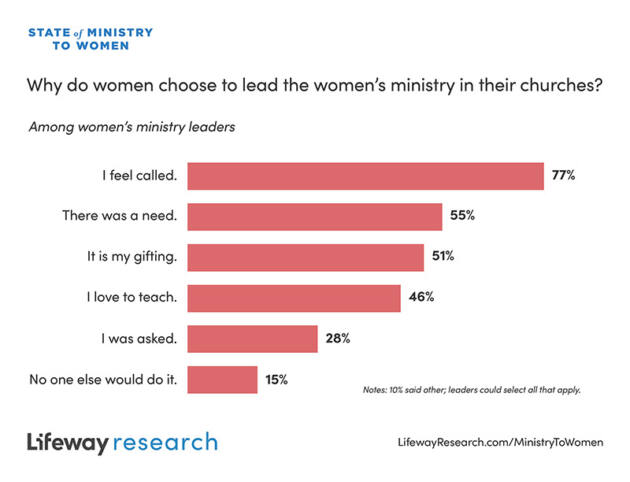Churchgoers and leaders find value in ministries serving women

Ministry leaders and women churchgoers believe ministry to women is working in their congregations, but both feel there’s room for improvement.
Lifeway Research surveyed 1,001 evangelical and Black Protestant female churchgoers in the U.S., along with 842 women’s ministry leaders for the State of Ministry to Women study.
“Lifeway’s investment in equipping churches for ministry to women spans almost 30 years,” said Becky Loyd, director of Lifeway Women. “As churches move forward into a new, post-COVID season of ministry, it was time to evaluate so we can be effective in reaching a new generation of women. This study was meant to do just that—highlight some reasons for celebration and identify areas where there is more work to be done.”
While acknowledging areas that need more investment, both leaders and those involved see value in their church’s ministry to women. Women in the pews, however, experience those benefits firsthand.
Church involvement and spiritual disciplines
Among women who attend church once a month or more, 96% say their church values women, including 80% who agree strongly. Fewer, however, believe their church invests in and equips women or say they have a place where they enjoy serving in their congregation. While 90% agree their church invests in and equips women, 63% strongly agree. Additionally, 84% of women churchgoers have somewhere they enjoy serving in their church, with 59% who strongly agree.“While women are positive about their churches, 1 in 5 indicate there is room for improvement in how well their church values them,” said Scott McConnell, executive director of Lifeway Research. “Even more women indicate their church could improve in proactively investing in women, with 37% withholding the highest rating for how well their church equips women.”
Still, most of the women are involved in their congregation beyond merely attending worship services. Two in 3 (66%) are involved in some type of small group or class for adults at least once during a typical month, including 28% who say they attend four times or more.
Women’s ministry offerings and opportunities
For around 2 in 3 churchgoing women (63%), their congregation has an organized women’s ministry. And another 21% say their church has activities specifically for women but nothing formal. Few say their church doesn’t have any activities for women (8%) or that they aren’t aware of any (7%).
Among those with some type of women’s activities at their church, female churchgoers point to the value that comes from having a women’s ministry, including stronger relationships among women in the church (68%), opportunities for women to be refreshed and restored spiritually and emotionally (65%), a place to ask questions and openly discuss faith topics (58%), stronger cross-generational relationships (56%) and a safe place for women to be transparent about needs and hurts (56%).
Other women’s ministry benefits according to women at churches with activities for them are support for what the church as a whole is encouraging (44%), receiving more biblical teaching than they would without it (35%), more serving in the community (30%), more relevant biblical application for women (30%), more serving in the church (28%) and more ministry done among women (27%). Less than 1% say none of these are added benefits for their church from their women’s ministry.
When asked what help they’ve received personally from their church’s women’s ministry, close to half say they have developed significant relationships with other women in the church (55%) and significant relationships with women in different age groups from their own (50%). Slightly fewer say it has made them more interested in attending activities that help them spiritually (45%), they’ve had more intentionality to their walk with Christ (38%), found a place to use their gifting to serve others in their church (36%) or have been mentored by a more mature believer (33%). Around 3 in 10 say the women’s ministry has given them tangible ways to serve the local community (32%), more confidence to present the gospel (30%) and more motivation to invite people to church (28%).
“Women report that women’s ministry has specifically helped them build meaningful relationships, provided true encouragement and allowed them to explore elements of their faith that were particularly relevant to them,” McConnell said. “Without the church offering these activities specifically for women, most say they wouldn’t have developed significant relationships and gotten to know women in other age groups. And many others report that their engagement in church activities, serving, sharing their faith and being intentional about their walk with Christ hinged on things their church’s women’s ministry provided.”
Close to 9 in 10 women say their church offered some type of activity specifically to develop community among new and existing women in their church, with the most popular events being some type of gathering around food like a potluck or lunch (63%) and holiday events (58%). More than 3 in 4 women whose church provided these types of community activities (77%) say they participated in at least one last year, including 19% who say they attended more than five such events.
Almost 9 in 10 women say their church conducted some events in the past year to disciple women and encourage their walk with Christ. Churchgoers were most likely to say their church offered Bible studies for women (57%), times for women to pray together (46%) and opportunities to serve in the community (42%). Almost 3 in 4 (73%) say they participated in at least one of these within the last year, including 15% who attended five or more of those events.
Churches seem to want to provide Bible studies that fit the schedules of women in different life circumstances. Among those who said their church offered Bible studies, 67% say they offered them outside of work hours, 58% say some were during the day on weekdays and 38% say the church did Bible studies specifically for moms with young children.
When asked for the reasons they chose not to participate in a women’s ministry event or gathering in the past year, female churchgoers pointed to several hindrances. A third (33%) said family obligations kept them away. Around 1 in 5 said they needed to work (23%), were out of town or sick (23%), had other activities planned (22%), some logistical reasons like the timing or cost (21%) or they had other priorities (19%). Fewer said it was about the event itself—the topic was not for their life stage (9%), they had a lack of interest in the topic (7%), certain women were or were not going to be there (4%) or the plan for the event (4%). Around 1 in 8 (12%) don’t think they missed any women’s events in the past year.
Personal help
Female churchgoers see ministry to women as a way to meet a host of spiritual and personal needs, and most say the church has been meeting those needs.
The top need women say they’ve been hoping women’s ministry activities in their church would help them with personally is growing closer to Jesus (71%). Most also want support when difficult things happen (60%), the ability to make friends (57%) and help when they feel discouraged (53%). A sizeable percentage also say they want their church’s women’s ministry to help them feel included (48%), heal from hurt (42%), deal with struggles in their faith (39%) and feel needed (31%).
Among the women who identified each of those areas, at least 7 in 10 say their church has offered activities that have helped them with that need, including 79% who said their church offered an activity that helped them grow closer to Jesus.
“A large majority of women are getting help from their church in the areas where they need it,” McConnell said. “But between 21% and 28% of women indicate specific needs that have not been addressed. This is more likely to occur in churches that do not have an organized ministry to women or activities specifically for women.”
Who’s leading women’s ministries?
Those leading ministry to women in their churches are leading out of obedience to God rather than for personal gain. More than 3 in 4 women (77%) say they are leading because they feel called. Another 55% say they chose to lead because there was a need, and 51% say they lead because it’s their gifting. The majority say each month they sense God confirming their call to lead (95%).As they serve, most women’s ministry leaders say they feel God is guiding them in their leadership (94%). And they lead sacrificially, with more than 4 in 5 (83%) serving as volunteers or unpaid staff members. Far fewer leaders are paid part-time staff members (9%) or paid full-time staff members (8%).
“It’s no surprise women are leading sacrificially, but the extent to which women are leading without compensation, even at large churches, should be a wake-up call,” Loyd said. “Because we see the effectiveness of specific ministry to women, imagine the impact churches could have with more intentionality and investment in building the leader of a ministry that likely reaches over half of a church’s attendees.”
First things first
 Most women’s ministry leaders say discipling women and encouraging their walks with Christ is the top priority for their ministries (57%). And events play an important role in reaching this goal. More than 4 in 5 (88%) women’s ministries offer Bible studies for women to disciple them and encourage their walks with Christ. Most also offer time for women to pray together (57%). Others provide opportunities to serve in the community (48%) or attend conferences as a group (40%). By far, women’s ministry leaders say offering Bible studies for women is one of the most effective events for encouraging women on their faith journey with Christ (80%). Leaders also say offering times for prayer (23%), attending conferences (16%) and providing opportunities to serve the community (13%) are some of the most effective events for encouraging women in their faith.
Most women’s ministry leaders say discipling women and encouraging their walks with Christ is the top priority for their ministries (57%). And events play an important role in reaching this goal. More than 4 in 5 (88%) women’s ministries offer Bible studies for women to disciple them and encourage their walks with Christ. Most also offer time for women to pray together (57%). Others provide opportunities to serve in the community (48%) or attend conferences as a group (40%). By far, women’s ministry leaders say offering Bible studies for women is one of the most effective events for encouraging women on their faith journey with Christ (80%). Leaders also say offering times for prayer (23%), attending conferences (16%) and providing opportunities to serve the community (13%) are some of the most effective events for encouraging women in their faith.
As women’s ministry leaders invest in the women in their congregations, they see the impact of their ministries goes far beyond themselves. Most say their ministry does well or very well at encouraging the spiritual growth of women (89%), encouraging women to obey God (82%) and engaging existing women in their church to serve others (61%). Close to half say their ministry works well or very well at mobilizing women to turn from sins (52%), connecting existing women in their church into community (50%) and mobilizing women to invite people to church (49%).
Ministry to women and the church
As women’s ministry leaders reflect on the role their ministry plays in the local church, most say their church values their women’s ministry (93%). Most (94%) also say their ministry regularly receives support from their pastor, with more than 3 in 4 (76%) strongly agreeing. And 71% say their church provides the women’s ministry with funds from the church budget. But few (5%) conduct women’s ministry planning together with the church staff.
“Very few women’s ministry leaders doubt they have support from their pastor or that their ministry is valued by their church. But some indicate there is room for improvement,” McConnell said. “Moving in a unified direction with the church’s goals requires communication. With so few women’s ministry leaders on staff and few of them planning alongside staff members, there are no doubt missed opportunities for maximizing the value of women’s ministry within the church.”
Challenges and needs
Women’s ministries in churches face many challenges. But leaders say the biggest challenges their ministries face are women not attending or participating (48%) and connecting with women in different age groups (45%). Women’s ministry leaders also see a variety of areas they feel they need to develop as leaders, with their top leadership needs having to do with recruiting leaders (43%), vision and direction (40%) and teaching and training (33%). And women’s ministry leaders are not alone in these challenges. According to the Greatest Needs of Pastors study from Lifeway Research, Protestant pastors say developing leaders and volunteers (77%), training current leaders and volunteers (68%) and establishing a compelling vision (45%) are some ministry difficulties they face that are top priorities for them.
“Churches with no organized ministry to women have a significant opportunity to make a change and help women spiritually. Finding a leader to begin offering relational, Bible-focused, relevant activities is critical for these churches,” McConnell said. “For churches who already have a women’s ministry, the greatest opportunity comes from women attending the first time, because participating in women’s ministry causes many women to be more interested in activities that help them spiritually.”
–Article written by Aaron Earls and Marissa Postell Sullivan, writers for Lifeway Christian Resources.











